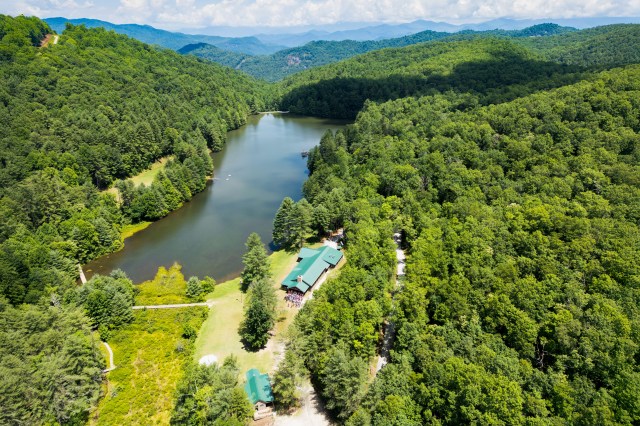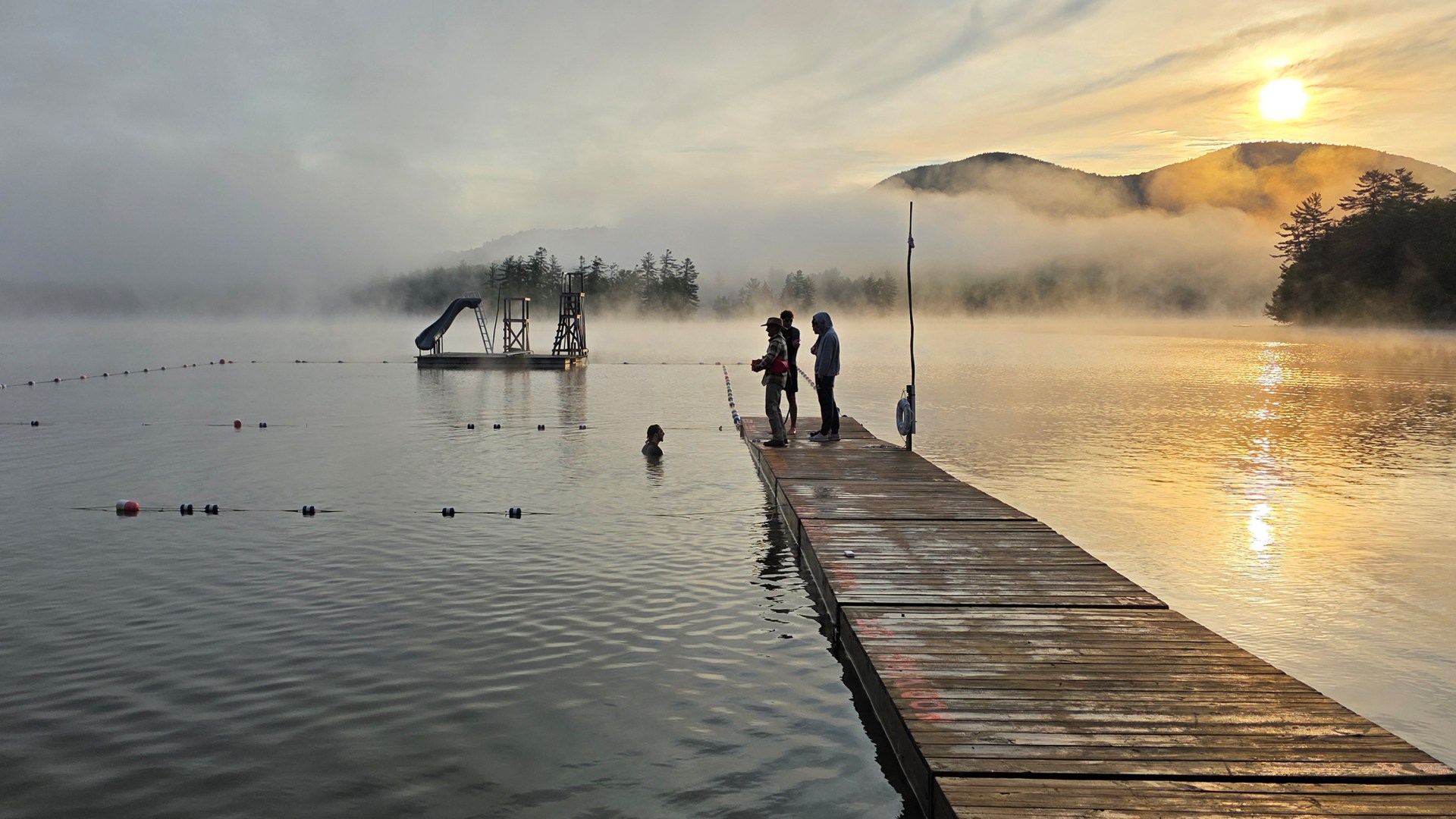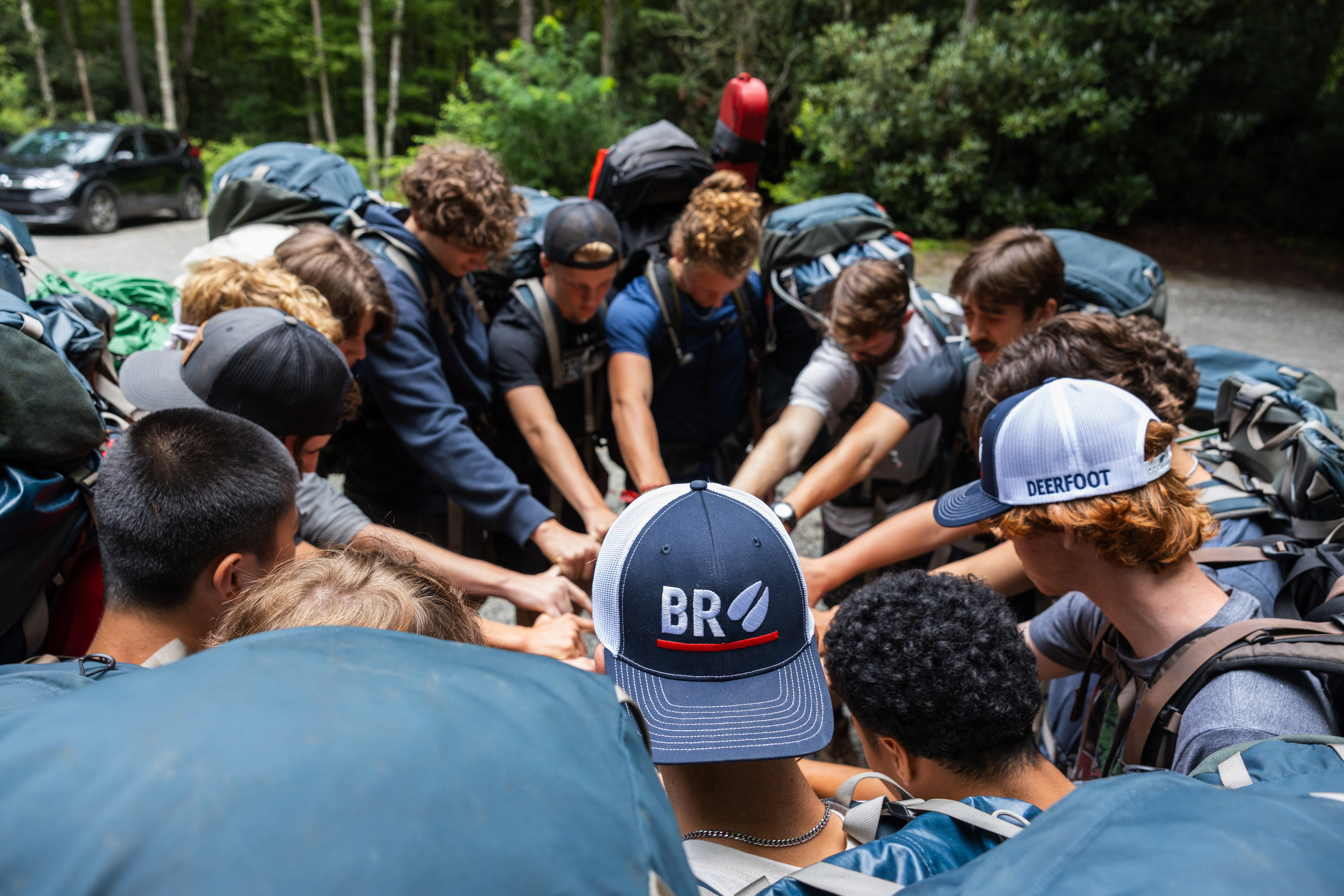As a kid, Amit Merchant never felt that he had a close group of Christian friends. Shy and unassuming, he didn’t fit in with his youth group peers.
But when Merchant was 11, his parents announced they would be sending him to a summer program in the wilderness of upstate New York, a two-week Christian boys’ camp called Deerfoot Lodge. Merchant had never heard of the camp before, but he gamely agreed to go—a decision that would reverberate in his life for years to come.
During that first summer at Deerfoot, Merchant felt seen and heard by fellow campers and staff, connected to a community of Christian boys. He and another camper, Ben, became friends and began emailing back and forth as soon as camp ended.
In the decade since, Merchant has kept returning to Deerfoot: first as a camper, then as a counselor in training, then as a staff member, and now as the assistant camp director. Ben has remained a close friend; the two worked on staff together, and Merchant attended his wedding.
What keeps drawing Merchant back to Deerfoot is the chance to connect with other Christian men in a way that feels authentic, uninterrupted, and gospel centered. In the tech-free wilderness, Jesus feels present, and relationships feel more honest.
“It’s one thing to sit in a coffee shop and ask a friend to tell me what’s on his heart,” Merchant said. “It’s another thing when you’re trudging through the woods and you’re caked with mud and the bugs are biting. It strips away so much of the false pretense and identity that we try to present.”
Many others echo Merchant’s story. Since its founding in 1930, Deerfoot Lodge has left a lasting impact on generations of Christian men and inspires loyalty among its attendees. Dads who grew up going to Deerfoot now send their sons to camp, and college students who attended as kids now work as staff to mentor younger campers. Those I spoke with—whether fourth-generation “Deerfooters” or young boys who had only recently become enamored—described the camp with fervor and a kind of reverence, the way young men talk of their fraternity brothers or soldiers describe their military platoons. What was it about this camp that inspired such awe?
My desire for an answer to that question was, in part, a personal one. I grew up attending different Christian summer camps. But for years, friends have been telling me about their experiences at this particular place on Whitaker Lake. Access to Deerfoot’s Adirondack location is somewhat limited to the public, and every year about 80 percent of the camp’s attendance is made up of returning campers. (Deerfoot recently opened a second location in the Blue Ridge Mountains of North Carolina, in part to try to address the long waitlist.)
My interest in Deerfoot also has to do with what’s happening outside its forested boundaries. The camp’s ongoing success comes amid a crisis for young men in America, in which many feel “unmoored and undervalued.” Boys typically lag behind girls in education outcomes, with worse GPAs and less likelihood of graduating high school. More women than men attend college, and about 28 percent of boys ages 3 to 17 have a mental, emotional, behavioral, or developmental problem, compared with 23 percent of girls. A recent Gallup poll that used data from 2023 and 2024 found that 25 percent of US men aged 15 to 34 reported feeling lonely, compared to 18 percent of young women.
What is plaguing so many young men across the country, and what might be the antidote to this malaise? Perhaps this small camp nestled in the Adirondack mountains—held in such esteem by so many boys and men—would have answers.
 Photography by Evan France
Photography by Evan FranceAs you’re driving along New York State Route 30, it’s easy to miss the narrow road that leads to Deerfoot. Except for a small sign, there’s little to indicate that a camp is tucked away in this stretch of the woods. On a recent day in July, I maneuvered my Toyota Corolla down the dirt road that snaked through the woods and led to the camp, where Ron Mackey, Deerfoot’s executive director, was waiting for me.
Dressed in khakis, a light blue T-shirt, and Saucony athletic shoes, Mackey had the briskness of an administrator but the warmth of a pastor. He led me to a clearing where the main camp buildings emerged, several cabins framed in a semicircle around a large field sloping down to the lake. Adirondack maples, beeches, and ash trees ringed the clearing. Some boys were setting up tents to dry after a long hike; others splashed in the lake or surrounded a snapping turtle that had wandered onto the grounds.
Noticeably, no campers were on their phones. There’s no cell service on the campgrounds, and devices are stored in the camp office at the start of each session. “It’s fully present,” Mackey told me while we strolled the grounds. “We live eye to eye here, fully engaged in the thing at hand. We’re not divided and distracted by other things. Life is slower here.”
Mackey and the other Deerfoot staff have tried to preserve the rustic way of life that was first established at the camp’s founding early in the 20th century. In 1930, Alfred Kunz, a New Jerseyan who served as executive director for the Pocket Testament League, decided he wanted to set up a wilderness camp for young men. His goal was to impart “sane, constructive religious teaching of a solidly biblical nature” and to help boys “bridge the gap from boyhood to manhood successfully, and as well develop a rugged, well-balanced manly character.”
With $500 and a couple dozen boys from his church, Kunz set up a camping spot near the Kunjamuk River. Campers originally had to hike eight miles just to reach this spot. But the camp flourished, and eventually Kunz needed to expand, so he purchased a square mile of property near Whitaker Lake. Relying on volunteer labor and a 1922 Buick roadster, he cleared the area and set up the camp.
Not much has changed since those days. Campers still sing many of the same hymns before breakfast. There is no running water in the camper cabins, and there are gas lanterns instead of electric lights.
Like any all-male community, Deerfoot has its own idiosyncratic lingo and rituals. Boss is the most universally used phrase, a kind of all-purpose affirmation: there are “boss” prayers, “boss” hikes, “boss” meals. Beak is the opposite, signifying anything negative. An outhouse is called a “gudge,” staff members are called “chiefs,” and phones are “contraband.” Mornings begin with a salute and the firing of a blank from a cannon. Many campers and counselors participate in a shared practice called “3,000-12,” in which the goal is to memorize 12 verses and perform 3,000 pushups over the course of two weeks. At any given moment at Deerfoot, you may see a boy suddenly drop to the ground and crank out a set.
Campers at Deerfoot’s Adirondack location are divided into three age groups: woodsmen are 9 to 12 years old, pioneers are 13 to 14, and islanders are 15 to 17. Most of their time at camp consists of learning various skills, including archery, swimming, crafts, and wilderness survival. Every age group also participates in an overnight outdoor excursion, ranging from canoe trips to hikes in the High Peaks.
The goal is to forge relational bonds through experiences that are exacting and uncomfortable. Benjamin Thomas, a 15-year-old camper who has attended Deerfoot in Blue Ridge for three summers, recalls hiking a steep mountain trail during a downpour. Drenched in rain and sweat, he felt miserable. But one of his fellow campers, a boy named Ransom, started belting out a hymn, and soon the whole group was singing.
“I felt the presence of the Lord that day,” said Thomas. “It felt like we were invincible. It felt like he was right there with his hand on me, comforting me.”
 Photography by Evan France
Photography by Evan FranceDeerfoot is built on the idea that transformation for men happens through relationships and that in-depth relationships between men often require shared experiences. Some at Deerfoot call this “trail talk”—the organic conversations that arise from hiking together or canoeing down a river.
“Intimacy among men needs to come from some shared activity,” said Jack Kubinec, a former staff member and camper. “I’ve seen in my own life [that] trying to be friends with guys in the real world, especially in a Christian context, it can be kind of like, ‘Hey, let’s sit around and have coffee,’ and it always feels awkward and never quite clicks.”
Every session, Deerfoot staff present the gospel to the campers. But the mission of Deerfoot—to build godly men through wilderness camping—happens not through flashy sermons or altar calls but through everyday interactions between staff and campers. It’s a “decentralized mentorship ministry,” as Craig Boronow, the Adirondack camp director, puts it.
“Every need of man is met by technology: We can work remote. We can have ‘friends’ remote. We can have entertainment. We can have sex remote,” said Dan Osborn, one of Deerfoot’s staff members. “All those things are remote. There’s a lot of isolation that occurs.”
Deerfoot does the opposite. It puts men in close proximity with each other: running ten miles back to camp after a week in the High Peaks or playing a camp-wide “naval battle” game, in which campers toss “bombs” made from clusters of leaves at each other.
“We get pegged as an adventure camp because we do adventures. But as uncompelling as this sounds, we’re really a relationship camp,” Mackey said. “We do relationships. Real ones. And that’s life-changing. And it’s also what so many boys and men are starving for at all ages.”
This model necessitates that Mackey and other camp leaders place an enormous amount of faith in their college-age staff counselors, the ones entrusted with exemplifying the way of Jesus. There’s a five-to-one ratio of campers to counselors. Every summer begins with three weeks of paid staff training. Deerfoot also has a summer-long counselor-in-training program for 17- and 18-year-olds called the Guide Program.
“If I were the counselor, I’m like a dad figure or maybe a grandfather figure to them,” Mackey said. “And they expect me to say certain adult things about God and Jesus. That’s what the grownups do. When it’s a really cool college guy and he’s celebrating Jesus, that makes an impact.”
Former staff member Kubinec remembers that when he was growing up, he never connected with the Christians at his evangelical megachurch, who didn’t share his interest in sports. “It felt like you couldn’t be a cool, funny guy and also love Jesus,” he said. When he first attended Deerfoot, he was surprised to see older counselors who were “six feet tall and ripped” but were also faithful followers of Jesus who served others. One of his defining memories was when a counselor sat patiently with him day after day, helping him learn how to dive—an encounter that gave him a glimpse of what it means to put others’ interests first.
“At times it’s hard to know what your masculinity is for,” he said. “When you’re growing up in school, masculinity is primarily talked about in terms of what you shouldn’t do. Deerfoot is a place that channels masculinity in a very healthy way, where it says that you don’t need to subdue your strength or your desire to yell or run around or do all these things that boys should do, but you should use that to serve others.”
Deerfoot, like many other Christian camps, can provide a “mountaintop experience” for campers, where the high of feeling close to Jesus quickly wears off once the summer is over. Mackey remembers a staff member telling him, “Jesus only works for me at Deerfoot. When I’m here, I hear it. I feel it. I want it. But when I go home, it’s a desert. It’s like he’s not there. It’s almost like a mirage.”
Since that conversation, Mackey has tried to conquer what he calls the “50-week problem.” How do you enable Deerfooters to sustain what they’ve learned and encountered even after they leave camp? He’s keen to emphasize that Deerfoot should never be a replacement for becoming involved in a local church.
“We’re not pretending to be a church,” he said. “We are constantly calling men to be engaged in their church. I hope every men’s ministry is a better ministry if they have Deerfooters in it.”
Deerfoot recently hired Osborn, a mission engagement director, to create programming for campers and alumni after the summer season wraps up. This year, Deerfoot will be launching a set of regional fellowships, in which local alumni will meet twice a year to do outdoor excursions together. The camp is also planning to set up a mentorship program where younger alumni can sign up to receive regular guidance from older Deerfooters.
Some alumni have already begun regularly connecting with each other. Douglas Goetz, 72, attended Deerfoot as a camper from 1961 to 1968 and was part of the first cohort of counselors in training. Now, he leads a weekly Zoom meeting on Monday nights for some other alumni, all of whom are over 60 and live across the US. The group of a dozen men spends time catching up—discussing the latest softball game or hike—before sharing prayer requests and discussing a devotional.
“By these Zoom meetings, we have remained brothers in Christ,” Goetz said.
My last night at Deerfoot concluded with a tradition that happens every camp session. Staff constructed a massive 15-foot bonfire on a grassy field near the lake, and all the campers gathered in front of it. As a plume of smoke rose into the sky and night gradually descended, each of the campers had the chance to throw a log into the fire and share one meaningful thing from their session.
One of the boys, dressed in a blue sweatshirt and flannel sweatpants, sidled up to the fire and tossed in a log. “I’m grateful for all the new friends I’ve made and how close Deerfoot has brought me to Jesus,” he said.
“I realized how big God is and how small I am,” another boy said.
“I really felt the Lord’s presence with me. I never want this to leave. I always want this to stay with me,” said another.
After many boys had shared, the entire group stood in an enormous circle. Placing their arms around each other, they began to sway and sing. Wood hissed and crackled. Sparks sprang from the flames and danced in the inky black sky.
Sons of Deerfoot, strong and true,
We will pledge ourselves anew,
And as we part to go our separate ways,
May the memories of these happy days
Keep us faithful unto him
Till we meet again.
Later that evening, I drove out from camp and into the night until the forest enveloped the sounds of laughter and song.
Christopher Kuo is a writer based in New York City. His work has been published in The New York Times, The Los Angeles Times, Duke Magazine, and elsewhere.




















